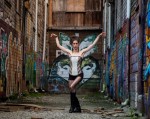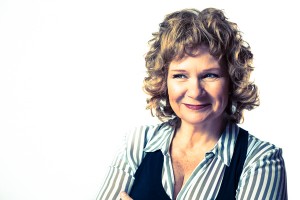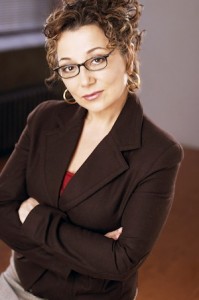Sold out. That pretty much describes every show the Jewish Independent saw during the Vancouver Fringe Festival last month – two even made the Pick of the Fringe, which ran the week after the festival.
There were at least five shows in which a member of the Jewish community was involved. Kerry Sandomirsky directed and Lynna Goldhar Smith was the production manager for Beverley Elliott’s … didn’t see that coming, which made the Fringe Picks, along with Goldhar Smith-directed Dirty Old Woman. Both of these shows featured confident, funny older women in the lead.
Elliott’s was a one-woman show, but pianist Bill Costin added well-played and well-timed musical (and other sound) accompaniment, as well as being funny in his own right, and he provided some lovely harmonies in the vocal arena. The performance moved along quickly, with Elliott sharing both humorous and touching stories of her life, from her lack of success with internet dating – “47 coffee dates and I’m going broke” – to a longtime friend committing suicide, to a New Year’s Eve show at Vancouver’s Royal Hotel, hot yoga and more. Interspersed with the stories were many songs, several of which were original numbers, and they, too, ranged from the silly to the sentimental. It was a standing-ovation-garnering performance.
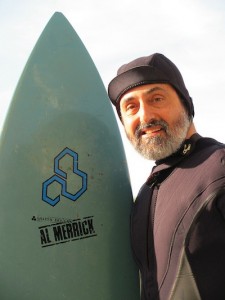
While the audience remained seated after Dirty Old Woman, they certainly whooped it up during the show, the actors having to pause more than once before the laughter subsided so that their next lines could be heard. The “dirty old woman” was played with impeccable comedic timing by Susinn McFarlen, who also made Nina a character with whom the audience empathized and for whom they rooted. She was surrounded by the excellent cast of Robert Salvador as Gerry, the much-younger and very handsome man with whom Nina strikes up a relationship; Emmelia Gordon as Liza, Nina’s daughter, who is somewhat jealous and completely unsupportive of her mother’s new relationship; and Alison Kelly as Diane, Nina’s best friend, whose marriage is “fine,” until it’s not. Written by Loretta Seto, the play didn’t feel scripted, but rather like watching snippets of real life.
Another writer who seemed to bring real people to the stage at this year’s Fringe was Charlie Varon, with Feisty Old Jew. Varon actually performed in front of the stage, a glass of water and a music stand the only props or set. As he enacted 83-year-old Bernie’s encounter with three 20-something surfers with whom he’s hitchhiked a ride back to his retirement home, Varon became each character.
Sharing not only what is said aloud between the people in the car, but what is going on in Bernie’s head, Feisty Old Jew is very funny and it is obvious that this production, these stories, are, as Varon told the audience, “a love letter” to his parents and that generation of Jews. Varon also shared a couple of short stories about another retirement-home resident, Selma, and, when he was finished, it was as if we’d met her. Varon said he has completed eight of 12 stories that he plans to publish as a collection in the next couple of years – it’ll be a fantastic read.
At the other end of the age range was Trey Parker’s Cannibal: The Musical, presented by Awkward Stage Productions, which provides young actors and crew the opportunity to learn theatre by doing. Young, of course, doesn’t mean inexperienced and the cast and crew of this Fringe show did an excellent job from start to finish – especially considering that there is no official script for Cannibal, which includes cartoons and animated backdrops, songs, dancing and dialogue. A lot goes on in this story, “loosely based” (to say the least) on that of Alferd Packer, “the first American to ever be convicted of cannibalism.” Not nearly as gross as it sounds, except for the short opening cartoon, this show was funny throughout and extremely well-executed.
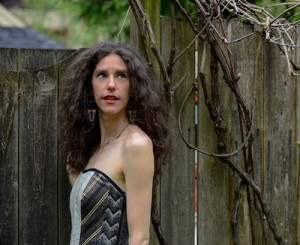
Rounding out the entertaining Fringe fare enjoyed by the Independent this year was Naomi Steinberg’s Goosefeather, which was quirky, thought-provoking, innovative and mesmerizing. In 2011, Steinberg interviewed her grandfather at his Paris apartment. She asked him 100 questions – about his youth, his first job, how he helped her grandmother survive the war, why he finds measurement so fascinating, why she, Naomi, is so stubborn. “You were born like that,” he responds in what turns out to be characteristically brusque fashion.
But this isn’t straight narrative. An experienced storyteller, Steinberg intersperses what she knows and learns about her grandfather with observations about the concept of measurement, of time and space. What do we measure? Our waists, our burdens? What are our favorite measuring tools? A yardstick, the position of the sun? There is no such thing as an exact measurement, she notes – scientists always allow for a margin of error.
Steinberg adds goose honks and other sounds, ticks of time passing, packaging tape unrolling; she responds to questions and reactions from the audience; she hugs a plastic blow-up globe, hangs a pocket watch on the wall; she is dressed in a corset made from her grandfather’s ties. The presentation as a whole is much more than the sum of its parts.
Currently traveling the world, “crossing longitudes and latitudes, carrying [her] own prime meridian” and making a map, Steinberg told the Independent in an email that she is “working on shows in California, Australia, China, Japan, England, Switzerland, France, Israel and then returning through NYC and across Canada.” When Goosefeather lands again in Vancouver, take the time to see it.

